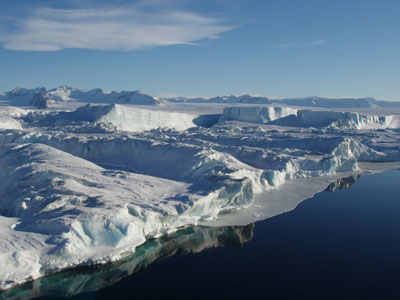
Global warming is real. Are the politicians listening? At least the story is on page one of the Washington Post.
WaPo: Escalating Ice Loss Found in Antarctica
Sheets Melting in an Area Once Thought to Be Unaffected by Global Warming
Climatic changes appear to be destabilizing vast ice sheets of western Antarctica that had previously seemed relatively protected from global warming, researchers reported yesterday, raising the prospect of faster sea-level rise than current estimates.
While the overall loss is a tiny fraction of the miles-deep ice that covers much of Antarctica, scientists said the new finding is important because the continent holds about 90 percent of Earth's ice, and until now, large-scale ice loss there had been limited to the peninsula that juts out toward the tip of South America. In addition, researchers found that the rate of ice loss in the affected areas has accelerated over the past 10 years -- as it has on most glaciers and ice sheets around the world.
"Without doubt, Antarctica as a whole is now losing ice yearly, and each year it's losing more," said Eric Rignot, lead author of a paper published online in the journal Nature Geoscience.
The Antarctic ice sheet is shrinking despite land temperatures for the continent remaining essentially unchanged, except for the fast-warming peninsula.
The cause, Rignot said, may be changes in the flow of the warmer water of the Antarctic Circumpolar Current that circles much of the continent. Because of changed wind patterns and less-well-understood dynamics of the submerged current, its water is coming closer to land in some sectors and melting the edges of glaciers deep underwater.
"Something must be changing the ocean to trigger such changes," said Rignot, a senior scientist with NASA's Jet Propulsion Laboratory. "We believe it is related to global climate forcing."
Rignot said the tonnage of yearly ice loss in Antarctica is approaching that of Greenland, where ice sheets are known to be melting rapidly in some parts and where ancient glaciers have been in retreat. He said the change in Antarctica could become considerably more dramatic because the continent's western shelf, an expanse of ice and snow roughly the size of Texas, is largely below sea level and has broad and flat expanses of ice that could move quickly. Much of Greenland's ice flows through relatively narrow valleys in mountainous terrain, which slows its motion.
The new finding comes days after the head of the Intergovernmental Panel on Climate Change said the group's next report should look at the "frightening" possibility that ice sheets in Greenland and Antarctica could melt rapidly at the same time.
"Both Greenland and the West Antarctic ice sheet are huge bodies of ice and snow, which are sitting on land," said Rajendra Pachauri, chief of the IPCC, the United Nations' scientific advisory group. "If, through a process of melting, they collapse and are submerged in the sea, then we really are talking about sea-level rises of several meters." (A meter is about a yard.) Last year, the IPCC tentatively estimated that sea levels would rise by eight inches to two feet by the end of the century, assuming no melting in West Antarctica.






No comments:
Post a Comment